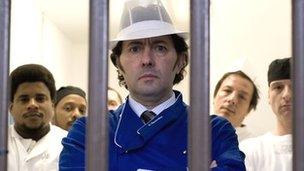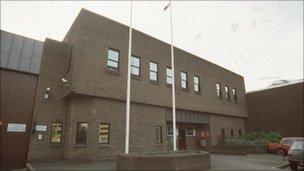Cardiff prisoners could run jail restaurant Clink
- Published
It's not in many restaurants that you need to have security clearance before placing your order.
But food lovers in Cardiff will have to do just that if they want to dine at a planned new restaurant - it will be in a prison and will be run by offenders.
If given the go-ahead by planners, HMP Cardiff fine-dining eaterie will be set up by the Clink Charity to help prisoners gain qualifications.
Diners will be searched before being cooked for and served by the inmates.
They will also have to submit an inquiry form when booking a table, which is then vetted by security, and have to bring photographic identification and hand over their mobile phones when arriving at the restaurant.

Chef Alberto Crisci set up the Clink restaurant scheme to help offenders gain qualifications
The aim of the Clink Charity, which was started by professional chef Alberto Crisci, is to reduce re-offending rates of ex-offenders by training and placing graduates upon their release into the hospitality industry.
It already runs a Clink restaurant in Sutton, Surrey and is looking for sites for new prison restaurants.
Cardiff council's planning committee has received an application to turn the jail's former visitor centre - a detached building within the prison boundary - into a restaurant.
Prisoners would work in the restaurant as cooks, waiters and cleaners, gaining City and Guilds, NVQ's and BIC's qualifications.
They will serve three course meals of fresh Welsh produce grown at an organic farm at HMP Prescoed in Usk, Monmouthshire.
Tables, chairs and other items of furniture used in the dining room will be manufactured by prisoners and they will also contribute poetry and art for the walls.

HMP Cardiff has a capacity for 784 male prisoners and currently has 96 life-sentencers
The only real difference compared to more normal restaurants is that alcohol will be off the menu and the cutlery will be plastic.
The planning application said that the plan "aims to provide a genuine opportunity for re training and life changing skill sets to offenders".
"The Clink offers prisoners the chance to gain food preparation, front of house service and cleaning qualifications," it added.
"Also, it provides first hand valuable experience within an exciting, dynamic business environment."
It said that the reoffending rate in the first year of release from prison is estimated to be around 50%.
But Clink has reduced this reoffending rate amongst its graduates to 20%.
The first Clink restaurant in Sutton three years ago within the walls of HMP High Down has so far trained 85 prisoners.
A Prison Service spokesperson said: "Prisons should be places of hard work that address the root causes of offending behaviour and where prisoners pay their debt to society.
"Skills learned through schemes like this increase the likelihood of prisoners getting a job on release - which reduces the chances of them reoffending - and allows deductions from their wages to be used for victims' services."
Cardiff Prison is a category B local / training prison - for those who do not require maximum security, but for whom escape needs to be made very difficult - and has a capacity for over 780 male adult prisoners.
According to the Ministry of Justice website, the number of life-sentenced prisoners has increased to 96.
- Published26 April 2011